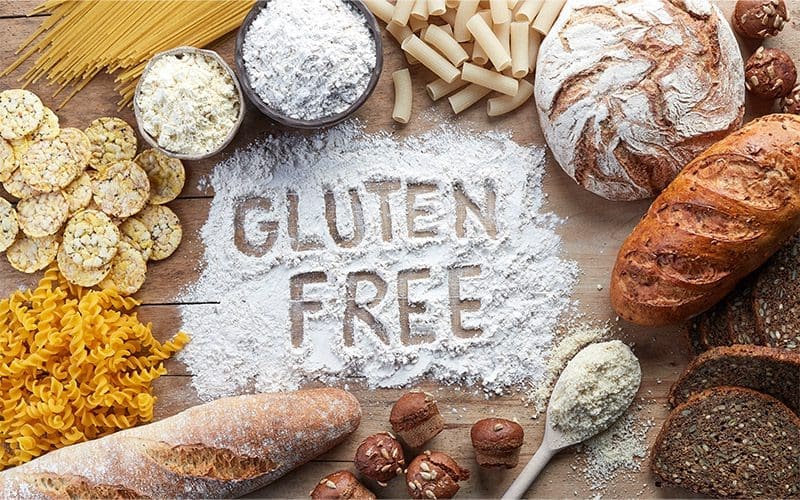
Published: September 30, 2020
Is Gluten-Free for Me?
Is that gluten-free? That’s a question you probably didn’t hear much 15, 10, or even 5 years ago. The interest in gluten-free diets doesn’t seem to be going away any time soon as we hear more and more about it from social media, family, friends, food packaging, restaurants, and even health care providers. So with all the buzz around gluten, how do you decide if a gluten-free diet is a needed change or a trend to ignore?
What is Gluten?
According to the Oxford Dictionary, gluten is a sticky substance that is a mixture of two proteins and is left when starch is removed from flour, especially wheat flour.
Along with wheat flour, gluten is found in a variety of other products such as:
- Wheat berries
- Durum
- Emmer
- Semolina
- Spelt
- Farina
- Farro
- Graham
- Einkorn
- Triticale (a cross between wheat and rye)
- Rye
- Barley and barley byproducts (malt and many beers contain barley)
- Oats (typically cross contaminated with gluten, although they are naturally gluten-free)
Gluten helps hold food together and acts as a glue to maintain the structural integrity of a product such as a baked good using yeast. Gluten is most active when the gluten-containing flour is moist and is moving by means of mixing or kneading. Many recipes include mixing or kneading to help the gluten proteins form, however, depending upon the other ingredients, a lot of gluten is not always good. It can cause products to become tough, rubbery, and heavy. Gluten comes from different flours and is integral in a lot of flour-containing products to maintain structure.
Who Should Avoid Gluten?
- Those with a condition called Celiac Disease, an autoimmune disease, need to avoid gluten. There is no specific cause for Celiac Disease, but it occurs in those who have a genetic predisposition. This can include having a family member with Celiac Disease or having other autoimmune disorders. It is estimated to affect 1 in 100 people worldwide.
When those with Celiac Disease eat food containing gluten, even the smallest amount, it can lead to an immune response (an attack) on the small intestine. This damage can destroy the villi, where nutrients are absorbed in the body, leading to malabsorption, vitamin or mineral deficiencies, anemia, fatigue, weight loss, and malnutrition depending on how frequently the villi are damaged and how small they become.
Cross contamination is a serious concern if you have Celiac Disease. For example, there are many variables to take into consideration when ordering pizza with a gluten-free crust:
- Did the employees properly wash their hands or change gloves before preparing the pizza?
- Are they using utensils that have touched a surface with regular flour?
- Is the pizza cooked in a designated place to keep the pizza gluten-free?
There is no other treatment for Celiac Disease beyond a strict gluten-free diet, making this a medically necessary lifestyle.
- If you have a wheat, barley, or rye allergy you may also benefit from a gluten-free diet. According to the American College of Allergy, Asthma, and Immunology, there is no such thing as a gluten allergy, however, people can be allergic to the grains that contain gluten.
As one of the Big 8 Food Allergens, wheat allergies are very common. These 8 food allergens account for 90% of allergic reactions to food. It is not 100% necessary to follow a gluten-free diet since most people are not allergic to all three gluten containing grains. For example, those with a wheat allergy could have products that contain barley as long as wheat is not an ingredient in the product or cross contaminated with the product. i.e. Gluten-free diets are wheat-free, but not all wheat-free products are gluten-free.
For those who are newly diagnosed, it may be comforting to see the gluten-free labeling as reassurance that it should not cause an allergic reaction. Allergic reactions can vary per individual, including:- gastrointestinal reactions (nausea, vomiting, diarrhea, and abdominal cramping)
- skin reactions (hives or a skin rash)
- anaphylaxis (a severe allergic reaction that occurs rapidly)
- If you have a gluten intolerance, following a gluten-free diet is beneficial. However, you likely will not need to be as restrictive. If you experience symptoms only with certain amounts of a product versus every time you have a product, you are usually labeled with an intolerance. Most individuals self-manage by learning what triggers symptoms and what can be tolerated. Individuals with a gluten intolerance will likely be able to consume foods that have lower amounts of gluten and will not need to worry about cross contamination as much. It is helpful to track your intake and symptoms so it is easier to find a correlation.
- If you have gluten ataxia, a rare autoimmune disease, you should follow a gluten-free diet. These individuals experience damage to the nervous system when consuming gluten and can cause a multitude of nerve related problems, such as:
- Trouble using extremities
- Difficulty speaking
- Trouble moving eyes
- Poor balance
- Poor coordination
- Tingling in extremities
- Gait problems
- Damage to the cerebellum (the part of the brain that controls coordination)
To prevent damage to the nervous system, a gluten-free diet is a must.
How Do I Know What I Have?
While you can be diagnosed accurately for an allergy and Celiac Disease, there is no set standard to determine if someone has a food intolerance. Speak to an allergist if you experience similar symptoms when consuming any food so you can get an accurate diagnosis. For Celiac Disease, it is recommended to visit with a board-certified gastroenterologist for further testing.
No Medical Issues?
If you don’t have a medical issue with gluten, following a gluten-free diet when not needed can add restrictions and fear of food without reason. Here are a few reasons to avoid a gluten-free diet if it is medically unnecessary:

- Most pre-packaged gluten-free food will be more expensive than the original product containing gluten. Purchase naturally gluten-free food to help keep the bill down.
- Many times the nutrition content is not the same in terms of fortification (added vitamins and minerals). Therefore, those on a gluten-free diet tend to take in less iron, calcium, fiber, thiamin, riboflavin, niacin, and folate. This may cause a need for supplementation or a need to eat food rich in these nutrients to offset the difference.
- In most cases, the gluten-free version will contain more fat to help with the texture making it more calorically dense than the original. Following a gluten-free diet that contains a lot of processed food will likely be higher in calories making weight loss more difficult or possibly causing weight gain depending upon the increase.
- Naturally gluten-free food, such as fresh fruit, fresh vegetables, gluten-free grains, lean meat, and low-fat dairy could be a lower calorie alternative that is still safe.
Dietary
Meeting with a Registered Dietitian can be very helpful for those with Celiac Disease, food allergies, and food intolerances. They will help you create a balanced diet that excludes any food components you should avoid. If you have several food allergies or food intolerances, it may be beneficial to seek out a registered dietitian that specializes in that area. If you have questions or would like to set up an appointment with one of Avita’s registered dietitians, contact:
- 419-563-9375 at Bucyrus Hospital
- 419-468-0674 at Galion Hospital
- 567-307-7948 at Ontario Hospital
Sources
- https://www.merriam-webster.com/
- https://celiac.org/gluten-free-living/what-is-gluten/
- https://www.finecooking.com/article/taking-control-of-gluten
- https://celiac.org/about-celiac-disease/what-is-celiac-disease/
- https://www.fda.gov/
- https://acaai.org/
- https://www.beyondceliac.org/celiac-disease/related-conditions/gluten-ataxia/
